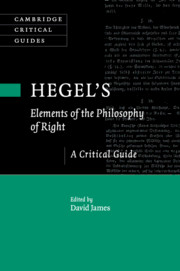Book contents
- Frontmatter
- Contents
- List of Contributors
- List of Abbreviations
- Introduction: Freedom and History in Hegel's Philosophy of Right
- 1 The Method of the Philosophy of Right
- 2 Property, Use and Value in Hegel's Philosophy of Right
- 3 Hegel on Morality
- 4 Hegelian Conscience as Reflective Equilibrium and the Organic Justification of Sittlichkeit
- 5 Living the Contradictions: Wives, Husbands and Children in Hegel's Elements of the Philosophy of Right
- 6 ‘The Ethicality in Civil Society’: Bifurcation, Bildung and Hegel's Supersession of the Aporias of Social Modernity
- 7 Why Ethical Life is Fragile: Rights, Markets and States in Hegel's Philosophy of Right
- 8 That Which Makes Itself: Hegel, Rabble and Consequences
- 9 Practical Necessity and the ‘Logic’ of Civil Society
- 10 How Modern is the Hegelian State?
- Bibliography
- Index
4 - Hegelian Conscience as Reflective Equilibrium and the Organic Justification of Sittlichkeit
Published online by Cambridge University Press: 16 March 2017
- Frontmatter
- Contents
- List of Contributors
- List of Abbreviations
- Introduction: Freedom and History in Hegel's Philosophy of Right
- 1 The Method of the Philosophy of Right
- 2 Property, Use and Value in Hegel's Philosophy of Right
- 3 Hegel on Morality
- 4 Hegelian Conscience as Reflective Equilibrium and the Organic Justification of Sittlichkeit
- 5 Living the Contradictions: Wives, Husbands and Children in Hegel's Elements of the Philosophy of Right
- 6 ‘The Ethicality in Civil Society’: Bifurcation, Bildung and Hegel's Supersession of the Aporias of Social Modernity
- 7 Why Ethical Life is Fragile: Rights, Markets and States in Hegel's Philosophy of Right
- 8 That Which Makes Itself: Hegel, Rabble and Consequences
- 9 Practical Necessity and the ‘Logic’ of Civil Society
- 10 How Modern is the Hegelian State?
- Bibliography
- Index
Summary
In this essay I analyze two of the major conceptions of justification in the Philosophy of Right and unpack the relation between them. I argue that we should link Hegel's conception of conscience to the account of reflective equilibrium introduced by John Rawls because Hegel's view of conscience contains the holism, as well as the back and forth between universal principles and individual judgments, that are central to the reflective equilibrium account. In the transition from ‘Morality’ to ‘Sittlichkeit’, Hegel switches the locus of justification from the moral individual to the whole ensemble of social institutions of modern life. This system of institutions is justified because of its organic, living structure characterized by the productive interplay of universal and particular ends. In contrasting these two models, my goal is to figure out just what Hegel thinks is wrong with the reflective model and what is gained in the move to organic justification. The main difference hinges on Hegel's orientation by action rather than by judgement, where the action-based organicism proves superior because it includes a public feedback process that supports a dynamic, self-correcting model of political justification.
Preliminaries
The recent proliferation of readings of the Philosophy of Right has not resolved a central interpretive issue. The issue is how to explain the relation between Hegel's theory of individual freedom, on the one hand, and his theory of the organic rationality of Sittlichkeit, on the other. Hegel does take pains to discuss the individual at every level of the account, yet he addresses some of his strongest polemic at political theories based on the individual will, and it is clear that the distinctiveness of his theory stems from his thesis about the social whole. There has been renewed attention to Hegel's concept of the free will as laid out in the Elements of the Philosophy of Right §§ 5–7, but that account of the structure of the will is compatible with emphasizing the primacy of the whole over the individual members of that whole. The persisting questions are the following: how strongly holist is Hegel's organicism; and is it compatible with core liberal democratic commitments? While not offering a full answer to these difficult questions, I will argue that the organic model has much to contribute to contemporary discussions on social and political justification.
- Type
- Chapter
- Information
- Hegel's Elements of the Philosophy of RightA Critical Guide, pp. 77 - 96Publisher: Cambridge University PressPrint publication year: 2017
- 2
- Cited by

